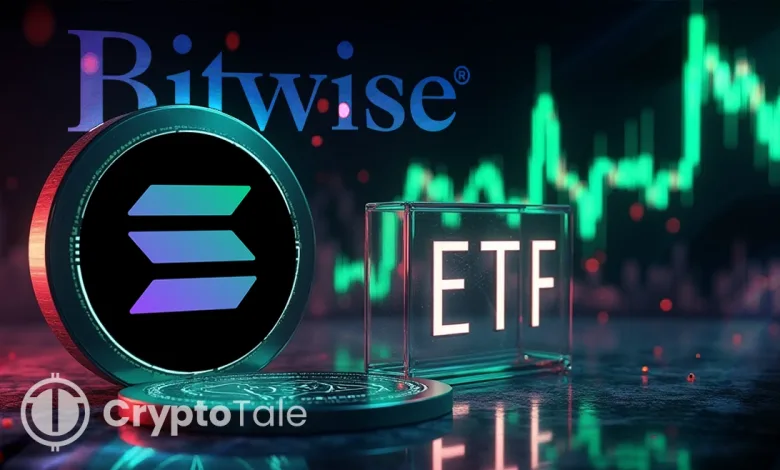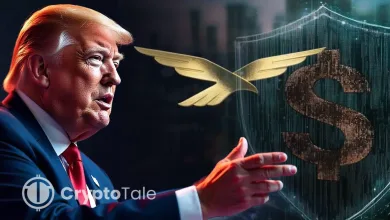Bitwise Solana ETF Sees $57.9M First-Day Surge

- Bitwise’s Solana ETF (BSOL) recorded $57.91M in first-day trading, the highest of 2025.
- BSOL debuted with $222.9M in assets, indicating a strong appetite for SOL exposure.
- SEC guidance on staking rules enabled BSOL’s approval and may accelerate future crypto ETFs.
Bitwise’s Solana Staking ETF (BSOL) made a strong market debut, recording $57.91 million in first-day trading volume, according to SoSoValue. The ETF, listed on NYSE Arca, began trading with $222.9 million in seed capital, the largest debut for any crypto ETF in 2025. Bloomberg’s Eric Balchunas described the launch as “unusually large,” surpassing early projections and similar fund rollouts.
First Solana Staking ETF Approved in the U.S.
BSOL is the first Solana staking ETF approved for trading in the U.S. It lets investors gain exposure to Solana (SOL) while earning staking rewards of about 7% a year. This setup gives investors a way to earn blockchain rewards through a regulated fund without having to run validator nodes or handle staking themselves.
Before trading began, BSOL had already attracted $223 million in assets. Bitwise Asset Management, a leading issuer of crypto-linked ETFs, launched the fund following months of regulatory review over staking classifications.
The SEC’s Division of Corporation Finance clarified in May that certain proof-of-stake (PoS) activities do not qualify as securities offerings. A follow-up statement in August expanded this to include liquid staking programs, paving the way for funds like BSOL to launch.
The ETF’s debut coincides with rising institutional interest in staking-based products. Bitwise’s research team noted that the fund is part of a growing change toward yield-generating blockchain assets. This comes as institutional investors seek compliant exposure to staking returns without operational complexities.
Institutional Demand and Market Context
BSOL’s performance outpaced competing products. Canary Capital’s HBAR ETF saw $8 million in its first day of trading, while its Litecoin ETF recorded just $1 million. By comparison, Bitwise’s $57.91 million debut exceeded Eric Balchunas’ forecast of $52 million, indicating stronger-than-expected investor demand. According to Farside Investors, BSOL also recorded $69.5 million in inflows on day one, nearly 480% higher than REX Osprey’s Solana Staking ETF (SSK).
Balchunas highlighted the $222.9 million in assets as “impressive” for a new crypto ETF, adding that the fund’s early seed capital indicated institutional readiness for Solana exposure.
Meanwhile, Multicoin Capital’s managing partner Kyle Samani called the launch a “watershed moment,” emphasizing that Solana’s inclusion in a regulated ETF opens access to capital previously restricted by compliance barriers.
He noted that most large trading firms and institutional investors were legally unable to trade or hold Solana until the ETF approval. This change, Samani said, now places Solana on a “level playing field” with Bitcoin and Ether, which have long dominated institutional portfolios. He further mentioned that the $25 billion currently locked in Ether ETFs could influence reallocation decisions, as investors begin comparing SOL and ETH exposure.
Related: Solana and Bitcoin Lead 155 Cryptocurrency ETF Filings
Key Structural Differences and Broader Implications
BSOL’s design differs sharply from REX Osprey’s SSK fund. Bitwise’s ETF provides direct spot exposure to Solana, with 100% of assets staked in-house. It features a 0.20% management fee, waived for the first three months, aiming to pass along the full staking yield to investors.
In contrast, SSK’s portfolio holds a mix of direct Solana positions, the CoinShares Physical Staked Solana ETP, JitoSOL, and short-term obligations, with a higher total expense ratio of 0.75%.
Analysts note that BSOL’s debut also is a milestone for regulated staking products in the U.S. Following Bitcoin and Ether ETF approvals earlier this year, institutional focus is expanding to alternative networks such as Solana and XRP.
JPMorgan previously estimated that Solana and XRP ETFs could attract between $3 billion and $8 billion in inflows within six months of listing. Bitwise had earlier launched a similar Solana staking product in Europe but delayed its U.S. counterpart amid regulatory uncertainty.
Now that things are clearer, BSOL’s success could pave the way for future staking ETFs linked to networks like Polkadot, Cardano, and Chainlink. Grayscale’s GSOL spot ETF is also launching this week, showing that staking-related ETFs are continuing to grow.
Bitwise’s strong start highlights rising interest from big investors in crypto products that offer returns. The size of BSOL’s launch, its fair setup, and its regulatory approval together show that staking ETFs are becoming an important new area in the U.S. crypto market.




